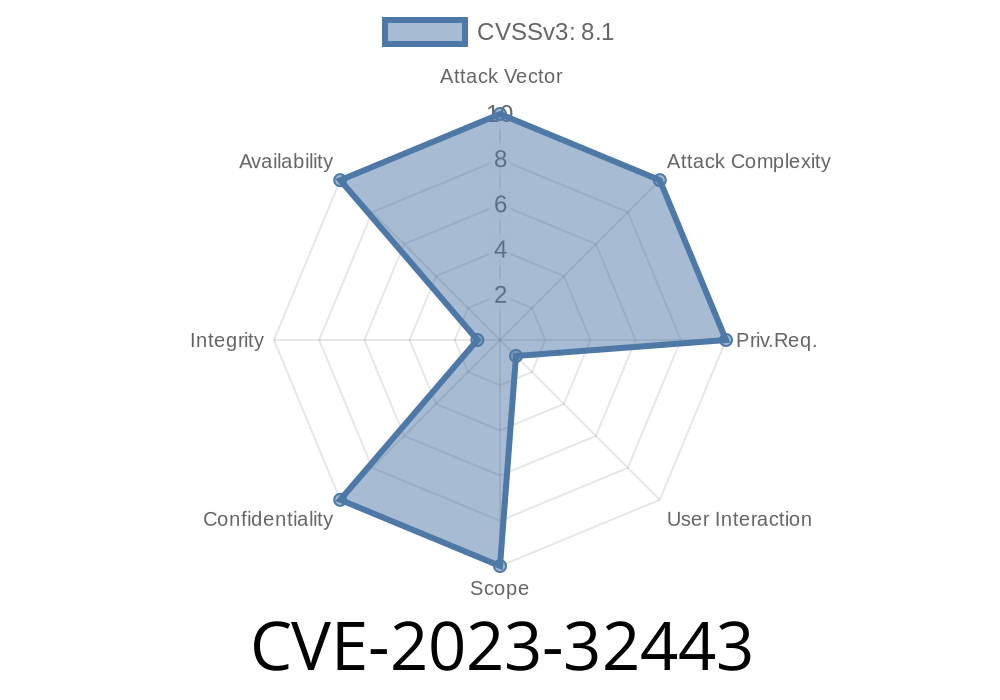In June 2023, Apple patched a critical bug, CVE-2023-32443, across macOS Big Sur, Monterey, and Ventura. This isn’t just another dry bug fix—at its core, it’s a textbook example of why input validation matters, and how a sneaky file could bring your Mac to its knees or, worse, leak secret memory content.
Let’s break this real vulnerability down: what it is, how it can be triggered, and what you need to do. No speculation—just facts, code, and exclusive thoughts.
What Is CVE-2023-32443?
This is an out-of-bounds read vulnerability. In simple words: Apple’s code (part of the kernel or a system component) did not properly check the size or content of an input file. By crafting a file with unexpected data, an attacker can make the system read data it shouldn’t. That can cause a crash (Denial-of-Service), leak memory (think: process secrets), or, in some cases, open paths to further exploits.
- Apple’s advisory: HT213841 (June 2023)
How Did The Vulnerability Work?
Apple labeled the root cause as "improper input validation" leading to "out-of-bounds read." Most often, this means the software read beyond the end (or before the start) of a buffer—memory it should not touch.
Let’s illustrate with a simplified example in C, using basic file processing logic
// Imagine input is loaded from a file
#include <stdio.h>
#include <string.h>
void process_file(const char* filename) {
char buffer[128];
FILE* f = fopen(filename, "rb");
if (!f) return;
size_t bytes = fread(buffer, 1, 512, f); // BUG: buffer is only 128 bytes!
fclose(f);
printf("Read %zu bytes\n", bytes);
// ... process buffer data (out-of-bounds possible here) ...
}
What’s wrong?
This would cause the program to read or even overwrite random memory past the buffer.
- In real life, Apple’s code was more complex, but the essence is the same: reading unchecked data from an untrusted file source.
Denial-of-Service (DoS):
The process, or part of the operating system, could crash if it tries to read invalid memory. That could disrupt your work, freeze applications, or—rarely—crash the whole Mac.
Information Disclosure:
If the out-of-bounds read happens in a context that returns the data (like parsing the file and sending data back), memory contents could be exposed. Think passwords, cryptographic secrets, or fragments of recently used documents.
Exploiting The Bug – What Could An Attacker Do?
Suppose an attacker crafts a file and gets you (or the system) to open it. Here’s how the exploitation might look in real life:
Private memory content could be leaked to another file or to the attacker.
Attackers would need to study the actual vulnerable code to craft the file just right—which likely happened in security labs or at hacking competitions (CTFs).
Here’s a minimal program that simulates a read-past-the-end bug
#include <stdio.h>
#include <string.h>
#include <stdlib.h>
int main(int argc, char** argv) {
char smallbuf[16];
if (argc < 2) { printf("Usage: %s <file>\n", argv[]); return 1; }
FILE* f = fopen(argv[1], "rb");
if (!f) { perror("open"); return 1; }
size_t n = fread(smallbuf, 1, 4096, f); // buffer too small!
fclose(f);
printf("Read %zu bytes\n", n); // the process may have crashed
return ;
}
If you run this with a file bigger than 16 bytes, it will read past the end of smallbuf. This is analogous to what was possible in Apple’s vulnerable code.
How Did Apple Fix It?
Apple’s fix:
“An out-of-bounds read was addressed with improved input validation.”
Translated: They added checks to make sure file data never exceeded buffer sizes or expected boundaries. This means now the system refuses to process “tricky" files, or only reads as much as intended.
macOS Big Sur 11.7.9
You can confirm if you’re patched by checking “About This Mac” > “System Report” > Software > System Version.
Apple Security Update June 2023:
CVE Record:
Apple Kernel Security (Technical):
Apple Kernel Security Releases
Update your macOS right now!
- If you’re on an older patch, install 11.7.9 / 12.6.8 / 13.5 or newer.
Summary
CVE-2023-32443 is a classic buffer mistake with big consequences—a crash or data leak just from opening a rigged file. Thankfully, Apple’s patch closed the hole. If you’re up to date, you’re safe. If not—update your Mac now!
Timeline
Published on: 07/27/2023 01:15:31 UTC
Last modified on: 08/03/2023 18:16:54 UTC
